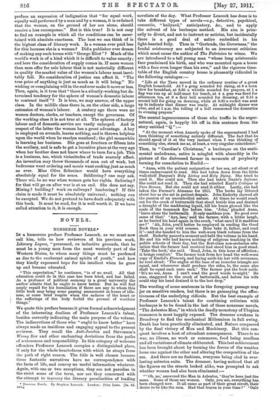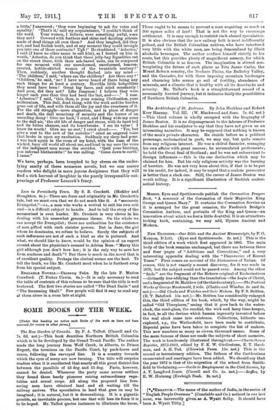NOVELS.
NONSENSE NOVELS.*
IN a humorous preface Professor Leacock, as we must now call him, tells us how reviewers of his previous work, Literary Lapses, "presumed, on inductive grounds, that he must be a young man from the most westerly part of the Western States, to whom many things must be pardoned as due to the exuberant animal spirits of youth," and how they kindly expressed hope for his intellect when he grew up and became educated.
" This expectation," he continues, " is of no avail. All that education could do in this case has been tried, and has failed. As a professor of political economy in a great university the author admits that he ought to know better. But he will feel amply repaid for his humiliation if there are any to whom this little book may bring some passing amusement in hours of idle-
, ness, or some brief respite when the sadness of the heart or the sufferings of the body forbid the perusal of worthier things."
We quote this preface because it gives formal acknowledgment of the interesting dualism of Professor Leacock's talent, besides correctly indicating the main purpose of the volume. The indiscretions of those who " ought to know better" have always made an insidious and engaging appeal to the present reviewer. They recall the Anti-Jacobin and Stevenson's Wrong Box and other enchanting deviations from the paths of seriousness and responsibility. In this category of welcome offenders Professor Leacock occupies a distinguished place, if only for the whole-heartedness with which he strays from the path of right reason. The title is well chosen because these fantastic narratives have no correspondence with the facts of life, and convey no useful information whatever. Again, with one or two exceptions, they are not parodies in the strict sense of the term, nor are they concerned with the attempt to travesty the literary peculiarities of leading Nonsense Novels. By Stephen Leacock. London: John Lane. [3s. 6d. net.]
novelists of the day. What Professor Leacock has done is to take different types of novels—e.g., detective, psychical, romantic, " kailyard," anticipatory, &c., and to apply the solvent of his burlesque method. His aim is prim- arily to divert, and not to instruct or satirize, but incidentally
there is a good deal of satire embedded in his light-hearted folly. Thus in " Gertrude, the Governess," the feudal aristocracy are subjected to an irreverent criticism which must cause the author of The Patrician to wince. We are introduced to a tall young man "whose long aristocratic face proclaimed his birth, and who was mounted upon a horse with a face even longer than his own," and the rigorous time- table of the English country house is pleasantly ridiculed in the following catalogue :— " Life at the Taws moved in the ordinary routine of a great English household. At 7 a gong sounded for rising, at 8 a horn blew for breakfast, at 8.30 a whistle sounded for prayers, at 1 a flag was ran up at half-mast for lunch, at 4 a gun was fired for afternoon tea, at 9 a first bell sounded for dressing, at 9.15 a second bell for going on dressing, while at 9.30 a rocket was sent up to indicate that dinner was ready. At midnight dinner was over, and at 1 a.m. the tolling of a bell summoned the domestics to evening prayers."
The mental ingenuousness of those who traffic in the super- natural, again, is happily hit off in this sentence from the story entitled " Q " :— " At the moment when Annerly spoke of the supernatural I had been thinking of something entirely different. The fact that he should speak of it at the very instant when I was thinking of something else, struck me as, at least, a very singular coincidence."
Then, in " Caroline's Christmas," a burlesque on the senti- mental melodrama, satire is mingled with absurdity in the picture of the distressed farmer in moments of perplexity turning for consolation to Euclid:— "Anna, with the patient resignation of her sex, sat silent or at times endeavoured to read. She bad taken down from the little wall-shelf Bunyan's Holy Living and Holy Dying. She tried to read it. She could not. Then she had taken Dante's Infermi. She could not read it. Then she had selected Kant's Critique of Pure Reason. But she could not read it either. Lastly, she had taken the Farmer's Almanac for 1911. The books lay littered about her as she sat in patient despair. John Enderby showed all the passion of an uncontrolled nature. At times he would reach out for the crock of buttermilk that stood beside him and drained a draught of the maddening liquid, till his brain glowed like the coals of the tamarack fire before him. 'John,' pleaded Anna, leave alone the buttermilk. It only maddens you. No good ever came of that." Aye, lass,' said the farmer, with a bitter laugh, as he buried his head again in the crock, what care I if it maddens me ?"Ah, John, you'd better be employed in reading the Good Book than in your wild courses. Here take it, father, and read it'—and she handed to him the well-worn black volume from the shelf. Enderby paused a moment and held the volume in his hand. He and his wife had known nothing of religious teaching in the public schools of their day, but the first-class non-sectarian edu- cation that the farmer had received had stood him in good stead. `Take the book,' she said. 'Read, John, in this hour of affliction; it brings comfort.' The farmer took from her hand the well-worn copy of Euclid's Elements, and laying aside his bat with reverence, he read aloud : The angles at the base of an isosceles triangle are equal, and whosoever shall produce the sides, lo, the same also shall be equal each unto each.' The farmer put the book aside. It's no use, Anna. I can't read the good words to-night.' He rose, staggered to the crock of buttermilk, and before his wife could stay his hand drained it to the last drop."
The wording of some sentences in the foregoing passage may jar on sensitive readers, but there is no gainsaying the effec- tiveness of the underlying ridicule. But the beat example of Professor Leacock's talent for combining criticism with burlesque is to be found in the last of these nonsense novels, "The Asbestos Man," in which the deadly monotony of Utopian romances is most happily exposed. The dreamer awakens in Broadway to find the mechanical Millennium in full swing. Death has been practically eliminated, and Nature conquered by the final victory of Man and Machinery. But this con- quest involves a host of attendant consequences. There is no war, no illness, no work or commerce, food being needless and all variations of climate obliterated. This last achievement has been brought about by turning the forces of the weather loose one against the other and altering the composition of the sea. And there are no fashions, everyone being clad in ever- lasting asbestos suits. The dreamer, having noticed that all the figures on the streets looked alike, was prompted to ask whether women had also been eliminated :—
" Oh, no,' answered the Man in Asbestos, they're here just the same. Some of those are women. Only, you see, everything has_. been changed now. It all came as part of their great revolt, their desire to be like the men. Had that begun in your time ? " Only a little,' I answered ; e they were beginning to ask for votes and equality.' That's it,' said my acquaintance, 'I couldn't think of the word. Your women, I believe, were something awful, were they not P Covered with feathers and skins and dazzling colours made of dead things all over them ? And they laughed, did they not, and had foolish teeth, and at any moment they could inveigle you into one of those contracts? Ugh !' He shuddered. `Asbestos,' I said (I knew no other name to call him), as I turned on him in wrath, 'Asbestos, do you think that those jelly-bag Equalities out on the street there, with their ash-barrel snits, can be compared for one moment with our unredeemed, unreformed, heaven- created, hobble-skirted women of the twentieth century ?' Then, suddenly, another thought flashed into my mind The children, I said,' where are the children? Are there any ? ' `Children,' he said, 'no! I have never heard of there being any such things for at least a century. Horrible little hobgoblins they must have been ! Great big faces, and cried constantly ! And grew, did they not? Like funguses ! I believe they were longer each year than they had been the last, and—.' I rose. `Asbestos!' I said, 'this, then, is your coming Civilization, your millennium. This dull, dead thing, with the work and the burden gone out of life, and with them all the joy and the sweetness of it. For the old struggle—mere stagnation, and in place of danger and death, the dull monotony of security and the horror of an unending decay ! Give me back,' I cried, and I flung wide my arms to the dull air, the old life of danger and stress, with its hard toil and its bitter chances, and its heartbreaks. I see its value ! I know its worth! Give me no rest,' I cried aloud—. Yes, but give a rest to the rest of the corridor!' cried an angered voice that broke in upon my exultation. Suddenly my sleep had gone. I was back again in the room of my hotel, with the hum of the wicked, busy old world all about me, and loud in my ears the voice of the indignant man across the corridor. Quit your blotting, you infernal blatherskite I' be was calling. Come down to earth.' I came."











































 Previous page
Previous page